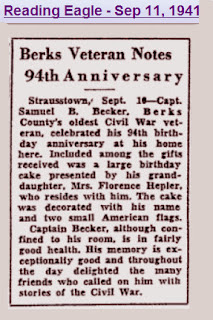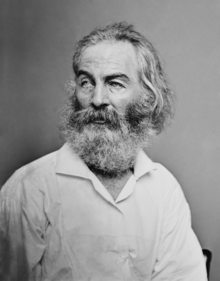On Christmas Eve of 1942 the oldest living Civil War Veteran
in Berks County shuffled off this mortal coil.
Samuel B Becker was a native of Reading and a longtime
resident of Strausstown PA where he taught school, worked at a hotel, sold farm
machinery, and worked as a blacksmith.
In 1861 when the war broke out at the age of 14, he enlisted
as a drummer boy in Philadelphia. He would serve through two enlistments with
Company B of the 107th Pennsylvania Infantry and the 53rd
Pennsylvania infantry. He would transfer from a musician to a fighting roll and
fight at Gettysburg and a few other engagements in Virginia eventually rising
in the ranks to a Company Captain.
He would attend the Gettysburg reunion.
He would fight at the famed “Devils Den” in Gettysburg and
was cited many times for bravery once saving his regimental colors from
capture. During this action he would be wounded numerous times, once in the leg
where he would carry the bullet for 15 days before getting treatment.
Later in life he would procure a “Canon de 75 model 1897”
WW1 artillery piece for a Veterans memorial at the end of town in Strausstown. His
great-granddaughter would unveil the piece.
He was well liked and well respected, the story of his
service was amazing…
If it were true…
You see, there was a problem with “Captain” Becker's story.
When researching Zions Blue Mountain cemetery for my project I began to pull up information
on him and things didn’t match.
First off let’s look at the regiments. He claimed to be in
the 53rd Pennsylvania Infantry and the 107th (not
specifying which one first). However, he also claimed to be at Gettysburg and
fought at Devils Den which ruled out the 107th which on the first
day fought at Oak Ridge on the Northern side of the battlefield and spend the
second day in a position near the “Bryan” house near the old location of the
Cyclorama (near Meades Headquarters)
The 53rd Pennsylvania showed up to the Gettysburg
battlefield on the afternoon of July 2nd and immediately moved to
the position of the Wheatfield. Not Devils Den but close enough.
So, I dug into the 53rd Pennsylvania. First, I
looked at their muster rolls from 1865. I went to Company B and scanned down
the list for Samuel Becker or anything that could be close (sometimes they
spelled their names incorrectly).
I searched the names and found no Becker present at all,
weird but not unexpected. The closest was a John Baker who was 32 which didn’t
fit. Throughout the course of my project there had been many names that were
left off the muster rolls for one reason or another, so it was nothing new.
I went through the other company rolls just in case his
company was misrepresented and found nothing.
Next, I turned to Samuel Bate’s “History of Pennsylvania
Volunteers” considered to be the “Bible” of Pennsylvania Regiments. Nothing in
there for a Samuel Becker in the 53rd. So, then I did an OCR search
for “Samuel Becker”.
The first hit that came up was for a Samuel B Becker….
that’s a match.
in the 53rd Pennsylvania…
yup that’s a match too
Company B…
match again
emergency militia…
not a match
Then I go to the official muster rolls of the 53rd
Pennsylvania Emergency Militia Company B
If he is claiming to have joined at 14 in 1861 this age
would be close to correct (depending on his birthday)
In 1863 General Robert E Lee was working his way north to
attack Pennsylvania after an immense victory at Chancellorsville to try to win
a battle on Northern Soil and turn the tide of the war. On June 12th
1863 Pennsylvania Governor Andrew Curtin quickly calling for the men of
Pennsylvania to enlist in an emergency militia to protect their homes from
Southern invasion. Thousands of men enlisted from all over the state but
luckily didn’t see action because of the Union forces stopping General Lee at
Gettysburg.
The 53rd Pennsylvania Emergency Militia served
from July 2nd, 1863, to August 18th 1863, a little over
one month, and never set foot in Gettysburg.
Then I turn to his second claim, to be enlisted in the 107th
Pennsylvania Infantry which would have been the regiment that he rose to the
rank of “Captain.”
First, I turn to the muster rolls for the 107th
Pennsylvania Company B where I find an 18-year-old Samuel “Baker”
Again, not uncommon for names to be misspelled on muster
rolls and everything else matches. This is a Muster OUT roll from 1865 and
shows his rank to be “Private.”
Then I turn to the Soldier and Sailors national database to
double check
Rank in Private…Rank out…Private.
The other point found in the muster rolls was the
description of his enrollment.
It seems mister Becker was DRAFTED into the 107th
Pennsylvania.
The final nail in the coffin for “Captain” Samuel Becker's
story came from the 1890 census. In 1890 the US Pension Office requested this
special enumeration to help veterans with pension claims and determine the
number of survivors and widows for legislation.
This would be from Samuel Becker's own words to the person
collecting the census.
Samuel Becker served in the 53rd Emergency
militia as a Private for one month (the numbers were reversed on the census),
then was drafted, and served as an orderly in the 107th
Pennsylvania. Even though he claims to have served in the 107th from
June of 1863 (maybe to reinforce his claim that he was at Gettysburg) all other
records show that he served from June 3rd 1864 to July
13th 1865 at the end of the war. This matches with the draft of the time. He participated in the Petersburg
siege campaign until the end of the war one year later.
As far as any records show he was never promoted, never
wounded, and never received any citations for bravery.
Private Samuel Becker would be honored as a hero in the
little town of Strausstown. He would tell his tale of “heroism” to anyone that
would listen and even travelled to join the soldier’s reunion of Gettysburg, a
battle that he never participated in.
My goal here is not to smear the life of Samuel Becker. He
undoubtedly should be remembered for his record of service. In fact, I am sure
if he had shared his stories of Petersburg and his time there, I’m sure he
would have received the same amount of respect from his fellow citizens.
This is a cautionary tale that in history sometimes you
shouldn’t take things at face value and stresses the importance of trying to
get the information right for future generations which is what I hope my
project will do.
Cut from website not sure what newspaper this is from

Harrisburg Telegraph December 1942






















